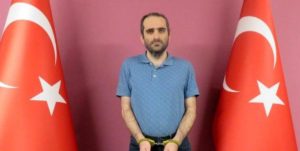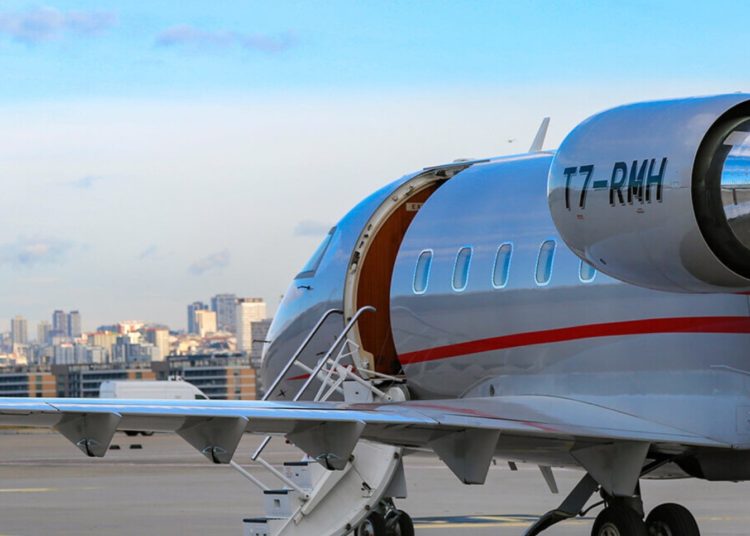Abdullah Bozkurt/Stockholm
In the kidnapping from Kenya of a US resident and critic of the Turkish government, Turkey’s intelligence agency (Milli İstihbarat Teşkilatı, MIT) used the same aviation company that was implicated in the scandalous escape of former Nissan chairman Carlos Ghosn from Japan to Lebanon via Istanbul.
According to a European security source who spoke to Nordic Monitor, Selahaddin Gülen, a 30-year-old teacher and a nephew of the Turkish president’s arch foe Fethullah Gülen, was flown out of Kenya on a jet owned and operated by an aviation firm called Black Eagle Havacılık Anonim Şirketi.
Black Eagle, formerly known as TOA Havacılık Anonim Şirketi, is wholly owned by Turkish businessman Tarkan Ser, who was implicated in the clandestine operation of flying Ghosn from Japan to Istanbul in December 2019.
Many suspected that Turkish government leadership was involved in facilitating Ghosn’s escape from Japan, and the alleged use of the same businessman in kidnapping of a critic from Kenya appears to corroborate the view that Ser has a contract with the Turkish spy agency.

The Brussels-based source highlighted that the Bombardier Challenger 604 type aircraft operated by Black Eagle made a flight on May 5, 2021 from Jomo Kenyatta International Airport to Ankara’s Esenboğa Airport and claimed that Gülen was secretly transported to Turkey on that plane under the supervision of Turkish spies.
Nordic Monitor’s review of data provided by the security expert shows that the plane with registration number T7-RMH took off from Kenya at 8:30 a.m. on May 5 and landed in Ankara at 2:24 p.m. the same day, coinciding with the timeline of Gülen’s abduction.
Flight history of T7-RMH:
The data also indicates that the plane originally parked at Ivato International Airport in Madagascar’s capital of Antananarivo and departed there at 4:05 a.m. on May 5 and landed in Kenya at 7 a.m. In Ghosn’s escape, the company used a similar pattern, arriving at Kansai International Airport on December 28 from Ivato International Airport.
The source believes that the plane took off from Madagascar when it got the green light and picked up the kidnap victim from Kenya and took him to Turkey in an illegal operation.
The flight history of the plane also shows that it made trips to Greece as well.
Airport activity at Jomo Kenyatta International Airport:
Faruk Bayındır, the former owner of private airline company Tarkim Aviation, posted a tweet saying he knew Ser well from industry meetings and claimed he had no financial resources for owning or operating aircraft.
He suggested that Ser’s planes were in fact used in illegal business affairs. Noting that he had spent years in the aviation business in Turkey, Bayındır said no one could pull off such an operation involving various airports around the world and the busy Istanbul hub without an order from influential people within the Turkish government. He effectively pointed the finger at the government of Turkish President Recep Tayyip Erdoğan in Ghosn’s escape.
Nordic Monitor’s review of trade registry records showed that Black Eagle’s predecessor, TOA, was established on July 17, 2019 in Istanbul by Maminiaina Ravatomanga, a Madagascar national who declared his address as Lot 14, AF Amboaroy Anthiroka 105 Ambohidratrimo, Antananarivo. Its startup capital was merely 50,000 Turkish lira ($8,768), which suggests it was established as a shell company. Considering it operated a multimillion dollar aviation business, the company had neither the capital nor the experience in operating private jets.
Trade registry filing for TOA Havacılık Anonim Şirketi:
Only four days after TOA was established by the Madagascar national in Turkey, Ser took over the company, becoming the CEO and owner while removing Ravatomanga from the board. The changes were reported to the Chamber of Commerce on July 29, 2019.
On June 12, 2020 Ser changed the name of the firm to Black Eagle. In August 2020 he reported that he had increased the capital of the firm to 1.9 million Turkish lira (approximately $257,000) without indicating the source of the funds.
Official records show TOA was renamed Black Eagle in 2020:
Although Ser was implicated in Ghosn’s escape, he managed to stay out of legal trouble, while the government scapegoated pilots Noyan Pasin and Bahri Kutlu Sömek, who were tried and sentenced to four years, two months in prison. Okan Kösemen, the operations director of MNG Jet, the company that was managing and operating the plane owned by TOA for Ghosn’s flight, also received the same sentence. The verdict was appealed by the defendants, who claimed they were following orders given by management.
A former Turkish prosecutor who spoke to Nordic Monitor on the condition that his name is to be withheld said the indictment and trial appears to have been a coverup by the Turkish government. He said the prosecutor who drafted the indictment did not look for the real culprits behind the plan while charging several employees with offenses that carried lighter sentences. Because of his close connections to the government, Ser was most likely protected by the investigating prosecutor, he added.
Black Eagle’s capital increase in trade registry filings:
President Erdoğan publicly bragged about the secret operation in Kenya, touting it as his determination to go after his critics. He said his government had captured an important figure and would release his name after interrogation.
Elements of the government of President Uhuru Kenyatta in Kenya were believed to have aided and abetted the Turkish intelligence agency’s abduction of Gülen despite the rulings of Kenyan courts that barred Kenyan authorities from handing him over to the Turkish government. Human Rights Watch said it would send a letter to the Kenyan government demanding an explanation of the abduction, while Gülen’s lawyer Jotham Arwa has been seeking answers in urgent court filings.
The crackdown on the Gülen movement, a group that is led by Turkish Muslim scholar Fethullah Gülen, who lives in self-imposed exile in the US and is opposed to the Erdoğan government, has become more brutal since the corruption investigations of December 17-25, 2013, which implicated then-Prime Minister Erdoğan, his family members and his inner circle.
A total of 292,000 people affiliated with the movement have been detained while 96,000 others have been jailed in the last five years according to a figure announced by Interior Minister Süleyman Soylu in September 2020.

According to statistics released by the Council of Europe (CoE), as of January 2020 out of 30,524 prisoners convicted on terrorism charges in the 47 CoE member states, 29,827 were in Turkey. In other words, 98 percent of all inmates convicted of terrorism in all of Europe are resident in Turkey. It shows how the government abuses its counterterrorism laws to punish critics, opponents and dissidents in this country of 84 million that is suffering under the iron grip of President Erdoğan.
The assets of thousands of people with alleged ties to the Gülen movement were also confiscated or frozen by the government. According to a report by Brussels-based human rights group Platform for Peace and Justice (PPJ), the total value of confiscated or frozen assets is $32 billion.
Critics of the Erdoğan government abroad, especially members of the movement, have also been facing surveillance, harassment, death threats and abduction since President Erdoğan decided to scapegoat the group for his own legal troubles.
In a joint letter UN rapporteurs accused the Turkish government of engaging in the systematic practice of state-sponsored extraterritorial abductions and forcible returns to Turkey, with at least 100 Turkish nationals from multiple states including Afghanistan, Albania, Azerbaijan, Afghanistan, Cambodia, Gabon, Kosovo, Kazakhstan, Lebanon and Pakistan removed to Turkey.
In a number of cases the UN Working Group on Arbitrary Detention (WGAD) concluded that the arrest, detention and forced transfer to Turkey of Turkish nationals were arbitrary and in violation of international human rights norms and standards.












